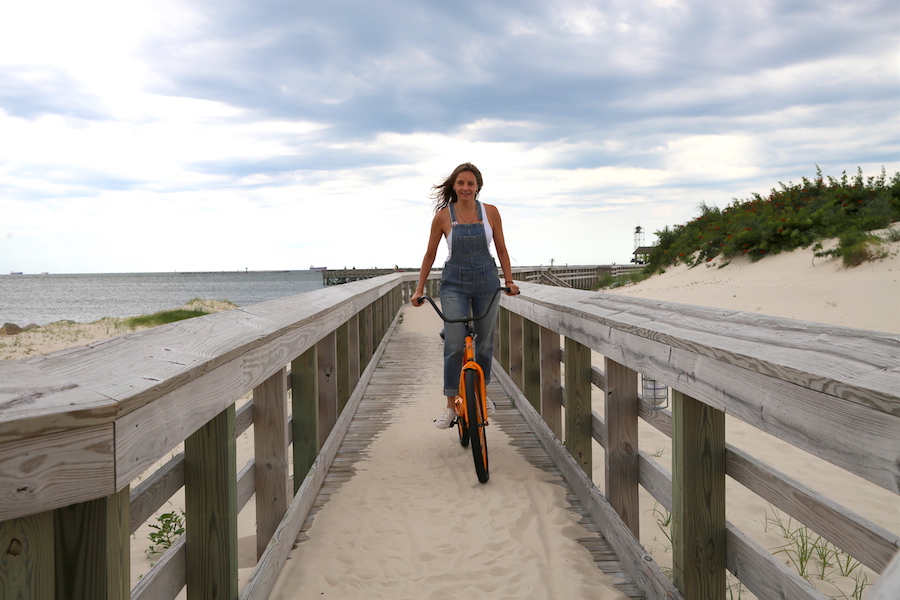I was wide-awake at three in the morning . . . again, lying in my bed trembling from the inside out. It felt as if my innards were vibrating like a washing machine was running on spin cycle inside my body. Surely this symptom had to mean that I had some mysterious and deadly illness. It must be an ailment that was so rare that they probably didn’t even have a cure, or worse, one that meant I would have to be quarantined in a plastic bubble for the rest of my shortened days.
This wasn’t my only symptom; there were also episodes of tunnel vision, tingling fingers, panic attacks, and lightheadedness. I had been to the emergency room so many times that I had started going to different hospitals for fear of being recognized as “a regular” by the nurses.
Each visit resulted in the same diagnosis.“You have anxiety,” said doctor after doctor.

That just couldn’t be, these symptoms were real and not some made-up condition. They were as legitimate as my pee being a fluurescent yellow the last time I showed up on Urgent Care’s doorstep. It was just a fluke that it ended up being the new vitamins added to my morning routine and not something of a more serious nature.
I demanded a neurologist appointment, believing that my tingling and other odd symptoms must be an early sign of multiple sclerosis, lyme disease, or whatever else Google had suggested that I had on that particular day. I had MRIs, EPTs, EMGs and NCVs. The diagnosis always remained the same; the conclusion never wavered like my daily symptoms.
“You do not have a neurological disorder, you have anxiety,” firmly stated the neurologist.
His words repeated in my head for days, if not weeks. Part of me was completely relieved while another huge chunk was utterly confused as to where to go from here. I had created a mess inside my body and mind, now I needed to figure out how to untangle the years of destruction.


It wasn’t too long after the neurologist’s diagnosis that I found myself curled up in the corner of my bedroom with an unsettling pit in my stomach and tears welling in my eyes. My body started to shake and the uncontrollable crying followed.
Looking in the mirror that morning, it became dismally evident that the person who stared back was a shadow of who she could be. I desired a life filled with passion, new experiences, and travel, but how was I supposed to live that dream when anxiety had caused me to be stricken with a fear for just about everything in the world. Just the thought of being restricted to a hair stylist chair for even an hour caused heart palpitations, how would I ever be okay with flying in a plane for over twenty hours to Africa or traveling solo through Europe or swimming among the sharks in the Galápagos Islands?
I was tired of the restrictions fear was placing on my life and, in that very moment, I was finally ready to do something about it. Without really knowing exactly which direction to go and being fearful of taking medications, I started to read everything I could get my hands on about overcoming anxiety, facing your fears, and living a passionate life. I devoured each word and took bits of advice from it all, creating a personal strategy. Little did I know, these eight fear-defying habits would completely change my life.
Maybe they can help you.

Overcoming Anxiety to Live Your Dream: 8 Tips to Facing Your Fears
Fear is an emotional response to potential danger, which is a vital reaction when we need to protect ourselves from legitimate threats. But, we often end up fearing situations that are not a life-or-death crisis—we fear something that might happen. Having a physical response to an intruder in the home is significantly different than having the same response to the thought that your plane will crash before you have even booked the flight.
People can fear everything from cockroaches to clowns to the number thirteen. Even though the list of insecurities is countless, most fit under the umbrella of four main fears: the fear of failure, fear of dying, fear of change, and the fear of not being good enough. These internal fears can prevent us from having incredible new experiences—stop us from living an adventurous, passionate, and empowering life. Anxieties can cause us to turn down the promotion at work for fear of failing at the position, we don’t ask our crush on a date for fear of not being good enough, or we never travel for fear of dying in a plane crash.
The toughest challenge of overcoming anxiety and facing your fears may be conquering the damage our own fears have created. But, a majority of the time your fears do not become a reality and then you wasted all the precious time worrying.
What would you do if fear were not a factor? Would you kayak with beluga whales in Manitoba or spend a week exploring all the best things to do in Florence? Would you dance the Flamenco with the locals in Spain or eat street food in Vietnam?
The possibilities are endless.

Facing your fears can be an intimidating experience, because it can seem as if they are so powerful that there will not be a way out. Just like with tackling a goal, taking baby steps is the key and not getting discouraged when you don’t see progress right away. It takes persistence and time.
1. Acknowledge the Fear
Many of us have fears that sit in the back of our minds, neglected, ignored, and unacknowledged. Even when the anxiety makes a physical appearance in our bodies we choose to just feel it, yet never truly name or understand it.
Start paying attention to how the physical reaction to fear feels in your body and acknowledge that sensation as a symptom instead of something greater.
Not understanding or acknowledging the symptoms easily perpetuated my fear and anxiety.
A slight tingle on a pinky toe could effortlessly turn into a self-diagnosis of gangrene, followed by thoughts of living with an amputated digit, and future visions of the manicurist’s horrified faces while giving me a pedicure.
Accept that what you are feeling is anxiety or fear and not something else, and then take responsibility for it. When you are finally able to name the problem you can start moving forward on conquering fear. Begin facing your fear by saying something like, “I understand that this is just my fear of speaking in front of a large group and not something greater. I understand what you are doing to my body and it will pass.” You can also write down all the physical feelings fear causes you, referring back can help you feel safe the next time it takes place.
I had spent so many years creating non-factual scenarios for everything that I was feeling, instead of simply calling them what they were.
Being able to finally sit back and say “my heart is beating fast, but I know that this is just because of the fear about boarding an airplane,” or “my calves are tight, that must be from walking through all the street markets yesterday.”

2. Challenge Your Fearful/Negative Thoughts
Norman Vincent Peale was quoted as saying, “Change your thoughts and you change your world.” This couldn’t ring more true, as our thoughts create the way we look at life and the interpretation of them creates the moods that we are having each and every day. Happy, positive, and optimistic thoughts create an entirely different interpretation of life than when our self-talk is plagued with fear and negativity. Changing our thought patterns is an integral part to working through the fear and creating a life of passion and adventure.
I had never analyzed or challenged my thoughts, never took a step back from them to assess what role they played. They just seemed to be something that had a life of their own: one bad one led to another which led to a downward spiral of negativity. The belief was that they were something that could not be controlled, much like aging or a natural disaster.
But, what if these adverse thoughts were not unmanageable?
What if they were a habit like overspending, avoiding eye contact, or saying “umm” when you speak? I put this possibility to the test.
For twenty-one days, the estimated time it takes to change a habit, every time I had a negative thought I would write it down in a journal. Then each sentence written was analyzed, asking myself questions like,
- Is this thought a fact?
- What will most likely happen in this situation?
- Will this be important in five years?
- What is the best-case scenario?
- What would be a more positive way to interpret this situation?
After this analysis, underneath that unfavorable thought, I would write the positive and more factual version of it. For example:
Fearful Thought: “I will never be able to afford to travel the world.”
Unrealistic Positive Thought: “I will be a millionaire soon enough and travel to every country in the world.”
Realistic Positive Thought: “It may take some time, but I can curb my spending in certain areas, slowly saving enough money for my dream trip to see the kangaroos in Australia.”
The first couple weeks of practicing this strategy produced a serious case of writer’s cramp! My pessimistic mind was in overdrive. But, after the twenty-one day period, I noticed that not only were my negative thoughts easier to immediately recognize, but also many of my initial thoughts were switched to positive ones instead. Now, I can almost immediately notice when my self-talk is heading down a negative path and can consciously stop it before it spirals into an anxiety episode. For me, this was a HUGE step in overcoming anxiety.

3. Keep a Gratitude Journal
Over the years there have been many studies on the positive effects of having an attitude of gratitude. Robert Emmons is a leading scientific expert on gratitude and its affect on people physically, psychologically, and socially. His studies suggest that people who practiced gratitude had higher levels of positive emotions, a stronger immune system, felt less lonely, and had more happiness.
Just like with challenging your fearful thoughts, when you notice yourself thinking of something negative, switch it around to what you are grateful for about the situation. When you are stuck in morning traffic, be grateful for being able to listen to your music for an extra twenty minutes. If your travel partner gets a cold in Paris, which botches your dream date night, be thankful for room service. Instead of focusing on how cold it is while walking through the streets of Zurich, be grateful for the warm chestnut stands. If you get lost on the streets of Venice, missing the opening of the Opera, be grateful for being able to walk the streets of one of the most beautiful cities in the world.
You should also start each morning by listing five things you are grateful for. In the beginning it will probably be a struggle to come up with a mere five, being wrapped up in a world full of fear can disguise the good in your life. Think hard. Did you just drink a deliciously warm cup of coffee? Or did you connect with a friend by text? Or enjoy a heartwarming movie on television? There is always something to be grateful for—always.
Need help with coming up with things to be grateful for? Read my article on Being Grateful: 100 Things to Be Thankful For Today

4. Turn off Negative Television
Terrifying plane crashes seem to be a common occurrence. Cases of Ebola and yellow fever are clearly diagnosed at a rapid rate. Countless solo travelers are viciously robbed at gunpoint while walking the day-lit streets of foreign countries. According to television news, the world is falling apart at the seams, making many not want to explore it.
There is no doubt that television is an incredible innovation, but many of the shows breed negativity, which can affect your psychological health. The news is filled with disaster and reality programs are loaded with drama; this is what viewers feed off of. Watching these types of shows alters your mood in some way, this is why horror films can cause nightmares and puppy commercials make you feel warm and fuzzy inside. Studies have showed that being exposed to negative news is linked to making people more anxious.
Certain television programs can also create unrealistic expectations of life and feelings of inadequacy.
Life is typically not like your favorite romantic comedy or fairytale. This expectation can make people disillusioned about what their relationships should be or how they should look. Our lives can feel mundane when compared to the seemingly perfect television character. If you ask any working nurse how their life compares to that of the staff on Grey’s Anatomy I am certain they will give you a totally different perspective.
Change the channel; stop watching news, movies, or television programs that feed your fears.

5. Manage Stress with Exercise
Stress not only affects the brain, but also has an impact on the rest of the body as well. Feeling anxious or stressed? Swim some laps in the pool, perfect your downward dog in yoga, or hit the gym to pump some iron. Taking a little time out of your busy day to exercise not only improves your body, but it also has the power of improving sleep, self-confidence, and concentration, which all can assist in lowering stress levels. Getting sweaty also boosts production of endorphins, chemicals in the brain that act as natural painkillers— your brain’s feel-good neurotransmitters.
I will be the first to admit to not being a huge fan of exercising. But, that changed when it became a part of my bucket list. I always made one of the goals I was working on a physical activity; learning to ice skate, hiking every trail at a local park, and running a 5k. Not only did the exercise help to release the anxious energy inside my body, but also the research and planning kept my mind focused on something other than the anxiety I was feeling.

6. Make a Fearless Promise to Yourself
We often make promises to ourselves about stopping a bad habit or changing our lives for the better. This is especially true as we conjure up New Year’s resolution ideas. During this time these promises result in gyms being flooded with newbies on January first, cigarette sales declining, and the local dog shelter getting over- whelmed with potential volunteers. Many of these resolutions that are made will only be forgotten in the upcoming months, if not weeks.
We often make promises to ourselves that we don’t live up to: I promise to eat better, to start exercising, and to spend more time with family. This time, you owe it to yourself to make one fearless promise and be able to rely on yourself to keep it.
That vow is to never let fear make your decisions for you.
This promise will dramatically change your behavior and improve your life. After I had some control over my anxiety, I made the same powerful promise to myself. When opportunities presented themselves and I wanted to say no, I vowed to ask myself if those negative answers were fear speaking. If it was, I promised myself to say yes instead.
This personal pact not only led to some of the most amazing adventures, but also pushed me into facing many fears head on, helping to overcome my anxiety and getting me out of my comfort zone.

7. Live the Bucket List Lifestyle
Creating a bucket list is only one small piece of the passionate life puzzle—actually living the bucket list lifestyle is the whole shebang. This lifestyle means waking up each day with the purpose of achieving goals, having new experiences, giving back, helping others complete their bucket list dreams and pushing the limit of your comfort zone.
It keeps you focused on something else besides your fear.
You will learn how to feel the fear and move past it in order to have a tick next to that goal. Plus, you will gain confidence each time you accomplish a feat and stepping out of the box will become the norm. You will learn that it’s not about just succeeding, but also about failing and learning from those failures.
Having a bucket list, along with my fearless promise, has pushed me out of my comfort zone being the support system I needed to try so many new things. It has also made me realize that most things aren’t as scary as you have imagined, that failing can be fun, that it is perfectly normal for not everyone to like you (or you them) and that perfection is a myth.

8. Expose Yourself to What You Fear
Mark Twain once said, “do the thing you fear the most and the death of fear is certain.” As scary as it is, sometimes to beat the fear you just have to do it—probably more than once.
Take that twelve-hour plane ride to Zurich, eat dinner alone in Vienna, and strike up a conversation with a stranger in Dublin.
Define your worst-case scenario of the unknown outcome, and realize that the worst rarely ever happens. You’ll begin to notice that each consecutive time you do the scary thing it gets a little easier. Understand that your fear of flying will not go away just because you have taken one plane ride. Each time will get a little easier, but you have to be repetitive.
Stanford neuroscientist Philippe Goldin told Lifehacker, “Exposure is hands down the most successful way to deal with phobias, anxiety disorders, and everyday fears of any sort.”


This article has been really helpful, thank you! I’m currently working as a nurse in Australia at an after hours doctor service, and have had to face my fear of flying a few times but it seems to slowly becoming less terrifying each time. Definitely becoming a fan of facing your fears!
It took me MANY flights before I was able to board a plane not in a complete panic! It was hard, but such a sense of freedom when you finally feel comfortable flying almost anywhere in the world.
What a great tips! This one is one of the best articles I’ve found on the site today, truly helpful. I am going to bookmark it for future reference.
Fear is and will always be the enemy. Gradual and simple implementation of your greatest fears will help to totally overcome them.
Agree!
DARE book (by Barry McDonagh) on living with anxiety and NOT getting rid of it.. changed my life. Anxiety can be your friend too!
(not affiliated, gratitude only)
Thanks for the tip! I’m sure everyone will appreciate it.
Thank you for sharing this article, it’s very brave of you ! I’ve always been to scared to travel alone, but I know someday I’ll do it because I can’t let fear get in my way like that !
Your blog really inspires me, I have the same concerns before too. My friend send me this link and reading your blog makes me feel fantastic. Thanks a lot for sharing and God Bless!
You are very brave for sharing this post. I too deal with anxiety. It can be crippling at times but I don’t let it stop me from pursuing my dreams. Thank you for sharing your story.
I think there’s many of us out there who suffer from anxiety. And I hope there will be many more who try to not let it stop them from living their dreams.
I, too, hope to beat my anxieties to achieve my dreams. In fact, that’s why I started my blog. Mental health is such an important topic to me in general and I feel that travel exposes me to many of my fears at once. Still, I try to push through. That’s the only way to do anything, though, isn’t it? Try your best and hope it pays off.
I agree, travel can expose you to many fears all at once. But, it’s great that you have been able to work through them.
That is great to hear! Just imagine what you can do in a month or even a year!